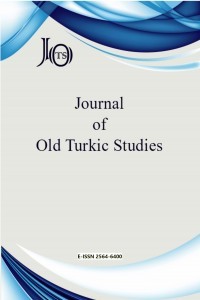Köl Tigin (K-10)’da Geçen Öd Teŋri ‘Zaman Tanrısı’ ile İlgili Fiili Yaşamak ‘Yaşamak’ mı, Yasamak ‘Tanzim Etmek, Düzenlemek’ mi, Yoksa Aymak ‘Demek, Söylemek’ mi Okumalıyız?
Köl Tigin Inscriptions, yašamaq, yasamaq, aymaq
Shall We Read the ‘Verb’ about “God of Time” (öd täŋri) in Köl Tigin (N 10) as Yašamaq ‘to Live’, Yasamaq ‘to Organize” or Aymaq “to Say”?
Köl Tigin Inscriptions, yašamaq, yasamaq, aymaq,
___
- BAZİN, L. (1991). Les systèmes chronologiques dans le monde turc ancien, Budapest: Akadémiai Kiadó.
- BAZİN, L. (2011). Eski Türk Dünyasında Kronoloji Yöntemleri, Çev. V. KÖKEN, Ankara: Türk Dil Kurumu Yayınları.
- CLAUSON, Sir G. (1972). An Etymological Dictionary of Pre–Thirteenth Century Turkish, Oxford: Oxford University Press.
- DOERFER, G. (1971). “Gedanken zur Gestaltung eines idealen Türkischen Etymologischen Wörterbuchs”, Orientalische Literaturzeitung, 66/9-10: 437-454.
- DOERFER, G. (1975). Türkische und Mongolische Elemente im Neupersischen, unter besonderer Berücksichtigung älterer Neupersischer Geschichtsquellen, vor allem der Mongolen- und Timuridenszeit, Band 4, Wiesbaden: Franz Steiner Verlag.
- DOERFER, G. (1984). “Türkçenin İdeal Bir Etimolojik Sözlüğünün Nasıl Olması Gerektiği Hakkında Düşünceler”, Çev. İ. ÇENELİ, Türk Dili, 392-393: 366-374.
- ERGİN, M. (1970). Orhun Abideleri, İstanbul: Milli Eğitim Basımevi.
- ORKUN, H. N. (1936). Eski Türk Yazıtları 1, İstanbul: Devlet Basımevi.
- ORKUN, H. N. (1941). Eski Türk Yazıtları 4, İstanbul: Devlet Basımevi.
- RADLOFF, W. (1895). Die alttürkische Inschriften der Mongolei, (Erste Lieferung), St. Petersburg.
- SERTKAYA, O. F. (1980). “Louis Bazin, Les Calendriers Turcs Anciens et Medievaux (Eski ve Orta Çağlarda Türklerin Takvimleri), -Aralık 1972’de Savunulan Doktora Tezi- Lille 1974, 800 s.”, Türkiyat Mecmuası, 19: 335-344. (Tanıtma)
- TEKİN, T. (1968). A Grammar of Orkhon Turkic, Bloomington: Indiana University Press.
- TEKİN, T. (1988). Orhon Yazıtları, Ankara: Türk Dil Kurumu Yayınları.
- THOMSEN, V. (1896). Inscriptions de l’Orkhon déchiffrées, Helsingfors: Imprimerie
- Yayın Aralığı: Yılda 2 Sayı
- Başlangıç: 2017
- Yayıncı: Erdem UÇAR
İslâm Öncesi Orta Asya Sikkelerinde Görülen Çin Sikke Darbı Etkileri
Eski Türk Yazıtlarındaki Kağan Seçme Ritüelinin İzleri Üzerine
Eski Uygurcada İlk Hecedeki Yuvarlak Ünlülerin Yazıçevrimi Problemi Üzerine
Sir Gerard Clauson’un Sözlüğündeki ‘Muhtemel Etimolojiler’ Üzerine
A Tale from the Pañcatantra in Central Asia? The Lion, the Bull and the Fox
